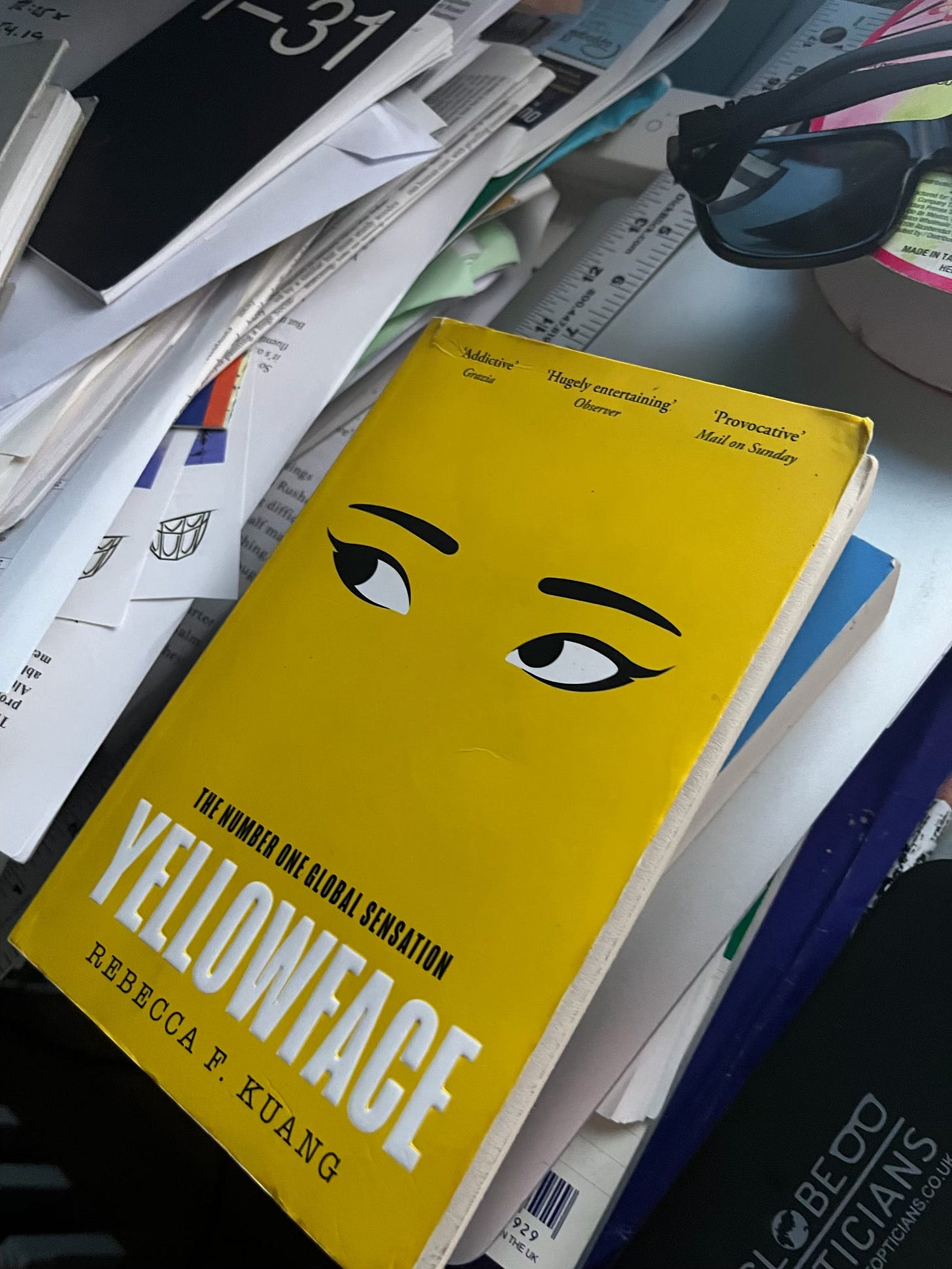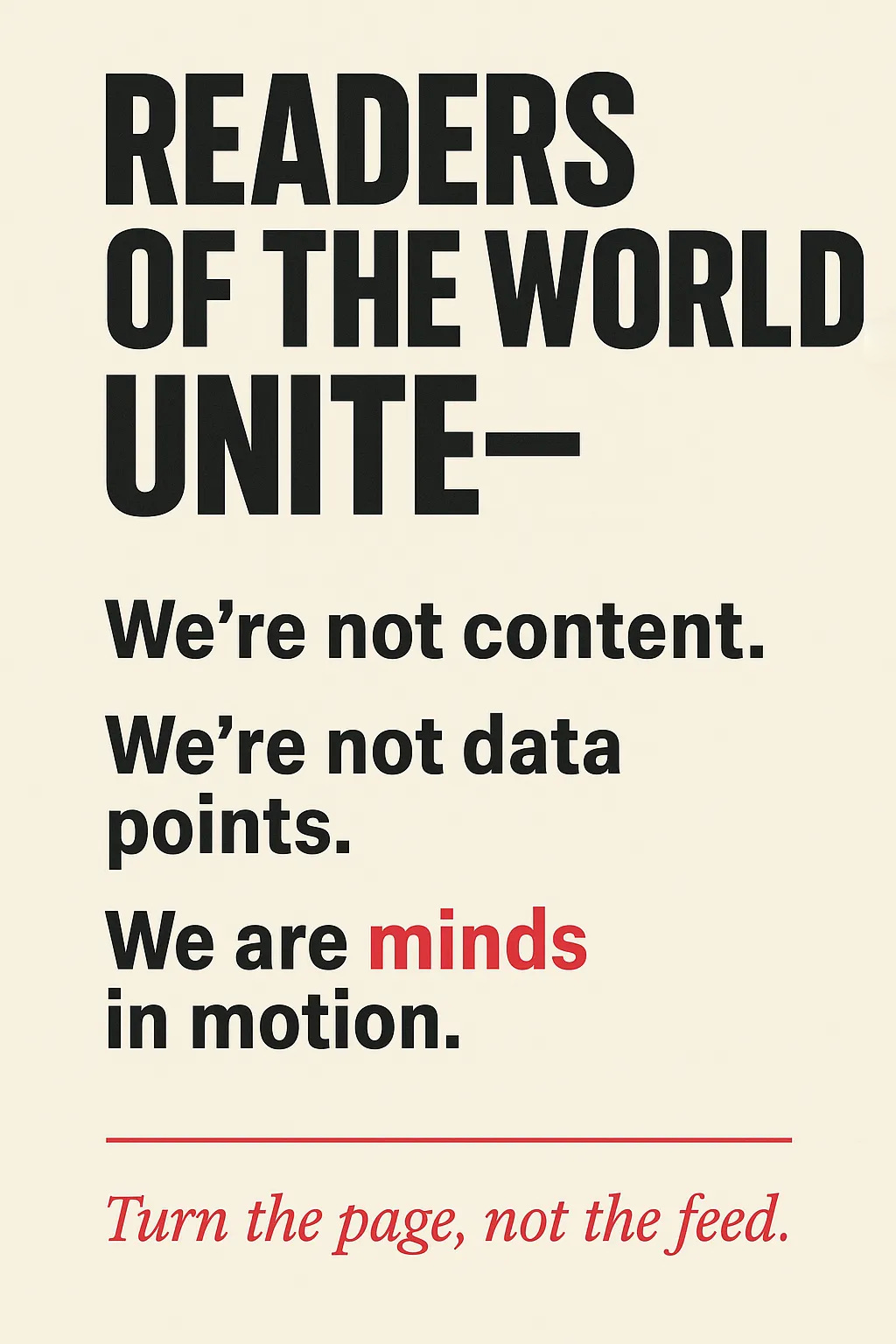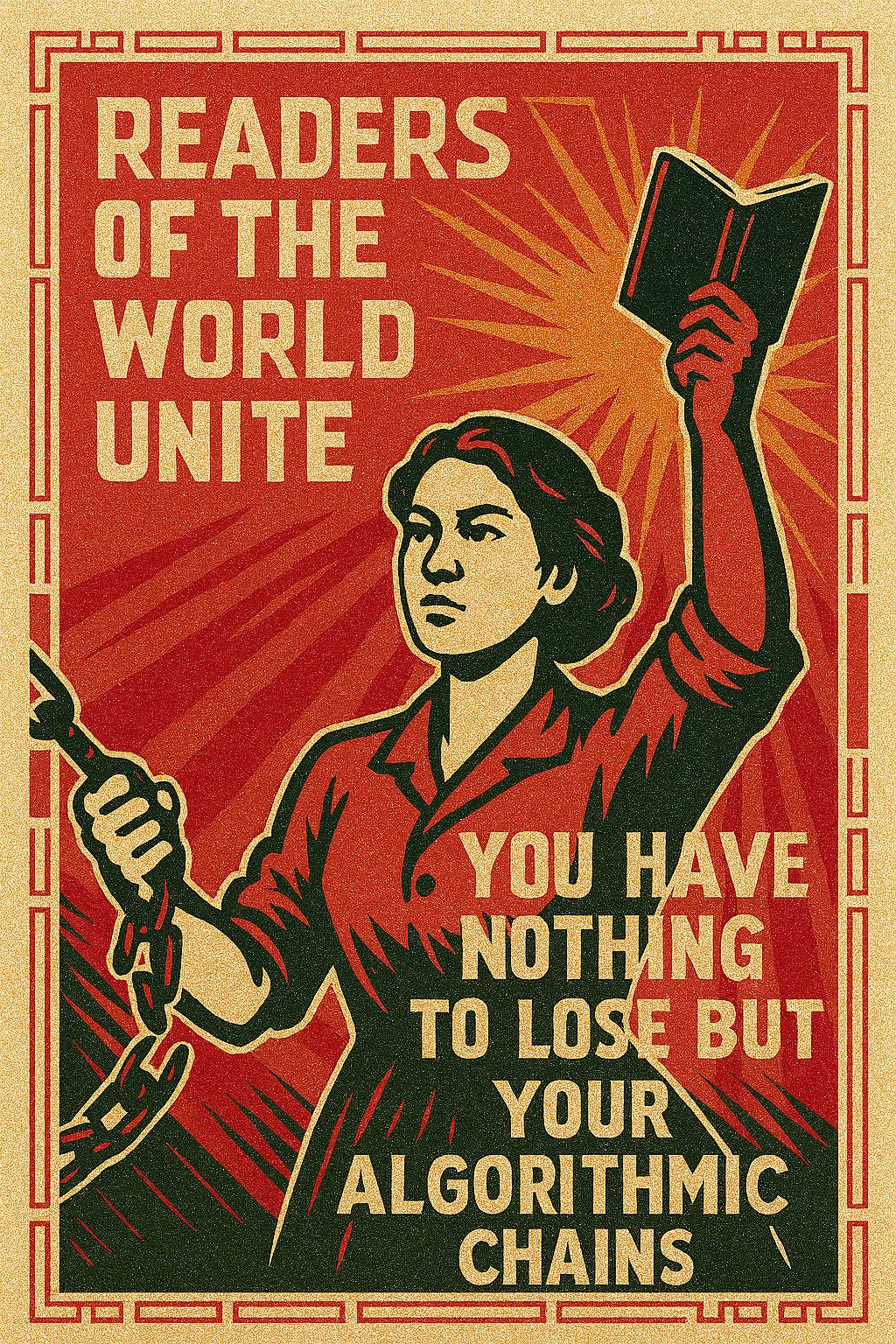Let’s start at the very beginning.
A brief sample of BookTok on Yellowface, 18th July, 2025
So. I liked this book quite a lot; read it in a sitting. Though rather like watching too many episodes of The Bear at one time, as well as the page-turner thriller complete with ghosts, it’s also a really tough slog through the cruel realities of American culture – culture increasingly without an NEA grant or a liberal press – right now. For example, in the first sentence of the acknowledgments, author Rebecca F. Kuang writes: ‘Yellowface is, in large part, a horror story about loneliness in a fiercely competitive industry.’
Which is pretty interesting for a supremely successful New York Times #1 writer. A big bestseller whose book is surely – surely – about to be filmed. Who is, just shy of 30, five big sellers into her other career. Kuang is also on the fourth leg of an academic life, Yale, via Cambridge, Oxford and Georgetown universities. She continues: ‘Compared to June and Athena [the protagonists] I am gratefully supported by the most wonderful friends, family and publishing team a writer could ask for.’
That’s something, then.
Well now. a horror story? About publishing? Whatever next? Well, actually many things. Because although this is a savvy and cautionary tale of plagiarism, authorship, cultural identity, appropriation, the commodifying of story, and – inevitably – the shifting seas of focus, from love to hate and death threats and back, of the online world* it is also a reckoning. A new telling of a terrible true story lost in history.
At the Hard Books desk
Before we start, start, I asked ChatGPT, that voracious reader, what it thinks happens when literature becomes content. ‘When literature becomes content, something essential is lost—even if something seductive is gained.
‘“Content” flattens. It treats all forms of expression as interchangeable units in an economy of attention. A novel, a tweet, a podcast clip, a meme: each competes for engagement, clicks, shares. Literature, by contrast, invites depth, ambiguity, and transformation. It resists being consumed quickly or algorithmically. It’s a space of delay and density—a kind of private, strange, resistant time.
‘When literature becomes content:
Voice becomes brand. Writers aren’t asked to write deeply, but to maintain an image. Persona is polished, identity is commodified. June in Yellowface grasps this instinctively—how to perform authorship rather than live it.
Meaning becomes metric. The question isn’t “What does it mean?” but “Is it viral?” or “Will it trend?” Subtlety becomes a liability; outrage becomes a tool.
Books become moral currency. In a content world, a book is often judged not by its inner complexity but by what it represents in the discourse: identity, politics, scandal. Kuang plays brilliantly with this—showing how Athena’s death [sorry] becomes a kind of content too.
‘But: this isn’t all new. The novel has always had to navigate market forces, fashion, scandal, and success. What’s new is the acceleration—and the expectation that a writer not only write but perform their selfhood online, constantly.
‘So perhaps literature-as-content isn’t a death, but a dangerous mutation. The question is whether literature can still hold space for what content can’t: silence, contradiction, failure, beauty, inwardness.’
Graphics by ChatGPT
In fact at first glance I think Yellowface holds a space for contradiction and failure and inwardness. And loneliness (but more of the latter, later in the week). Perhaps beauty takes a hit here, but then again, one of the very clever things about this book is the embedded truth of the subject matter of the stolen manuscript – which subsequently becomes a huge bestseller.
Because, let’s start with the book within the book. The meta MacGuffin. The Last Front, first written (spoilers, sorry) by the newly dead young and absurdly gifted bestseller, Athena Liu, is a war novel about the 140,000 Chinese workers recruited by the led-by-donkeys British Army, and sent to the Allied Front in the first World War.
Graphics by ChatGPT
So, I delve. ChatGPT writes: ‘The Chinese Labour Corps (CLC) was established by Britain and France to provide manpower for the Western Front. Most labourers came from Shandong Province, a poor, rural region in northeast China. They were not combatants, but their work was essential: digging trenches, unloading ships, repairing roads, burying bodies, handling munitions, and clearing battlefields. They were recruited under harsh contracts with promises of good pay, but faced brutal working conditions, segregation, and casual racism. Many died—from disease, poor treatment, or accidents. Estimates vary, but around 10,000–20,000 deaths are commonly cited.’
I simply didn’t know this. Why? ChatGPT suggests…
Imperial silence: Britain and France downplayed their role to preserve Eurocentric narratives of the war.
Racial hierarchy: Their labor was seen as unworthy of remembrance.
Postwar geopolitics: China’s contribution was ignored at the Treaty of Versailles. This became a galvanizing moment in Chinese intellectual history (e.g., the May Fourth Movement in 1919).
Archival neglect: Few written records from the laborers themselves survived. Much was lost or never recorded.
And as I read on I discover the May 4 movement. Wow.
‘After World War I, China expected to reclaim Shandong Province, which had been under German control and occupied by Japan during the war. China had entered the war on the side of the Allies in 1917, largely as a way to regain sovereignty and international respect—symbolized in part by the 140,000 Chinese laborers who served the Allied cause.
‘But at the Paris Peace Conference, the victorious Allies decided to give Shandong to Japan, not return it to China. This betrayal sparked outrage across the country. On that day, over 3,000 students from 13 universities gathered at Tiananmen Square in Beijing to protest the Versailles Treaty and the Chinese government's weak response. The protest spread quickly—workers, merchants, and intellectuals joined, marking a new alignment between classes.
The slogans included:
“Don’t sign the Treaty of Versailles!”
“Return Qingdao to China!”
“Down with the warlords!”
‘Some students were arrested. Others burned Japanese goods and government officials' homes. The spark became a nationwide movement. It questioned everything: Confucianism, traditional values, the role of women, language, politics, and China’s place in the modern world.
Graphics by ChatGPT
Key Characteristics:
Anti-Imperialism
Outrage at Western betrayal and Japanese aggression.
Birth of modern Chinese nationalism.
New Culture Movement
Already underway since the mid-1910s, the May Fourth protests supercharged this intellectual wave.
Called for science, democracy, feminism, vernacular literature, and political reform.
Language Reform
Advocated replacing Classical Chinese with baihua (vernacular Mandarin) in literature and education—seen as more accessible and democratic.
Led to a literary renaissance: Lu Xun, Hu Shi, and others began writing modern fiction in the vernacular.
Rise of Radical Politics
Some participants turned toward Marxism and communism.
The Chinese Communist Party was founded two years later in 1921, with May Fourth veterans among its founders.
May Fourth redefined the role of the writer in Chinese society: not just storyteller, but public intellectual, reformer, nation-builder.
It established literature as a vehicle for truth-telling, reform, and resistance.
It forged a deep link between language, voice, and national dignity—a thread that echoes even in a novel like Yellowface, where who gets to tell which story still matters intensely.’
And that will do for today. A great example of a popular bestselling contemporary book, with a romping thriller approach, a will-they, won’t they get away with it lead character –a talented amoral Ripley gaslighting the global Reading Group – taking us, should we choose, into the very maelstrom of twentieth century geopolitics.
And not to the usual Mincemeat places.
Thank you, Rebecca F. Kuang – what a new perspective for me on WW1. Tomorrow, the plot of Yellowface; Roland Barthes & The Writer on Holiday; and Montargis, a small town about 110 km south of Paris.
*Although published in 2024, Yellowface has a lot of Twitter in it, before it was X’d.
Robin - Monday
Hard Books - waiving goodbye to TL:DR




I read Yellowface last year. I completely missed the story within the story aspect. Cool history. Great stuff.👍
Thank you. I’ve more on this story within a story as the week unfolds.